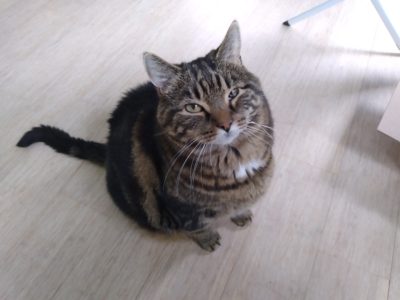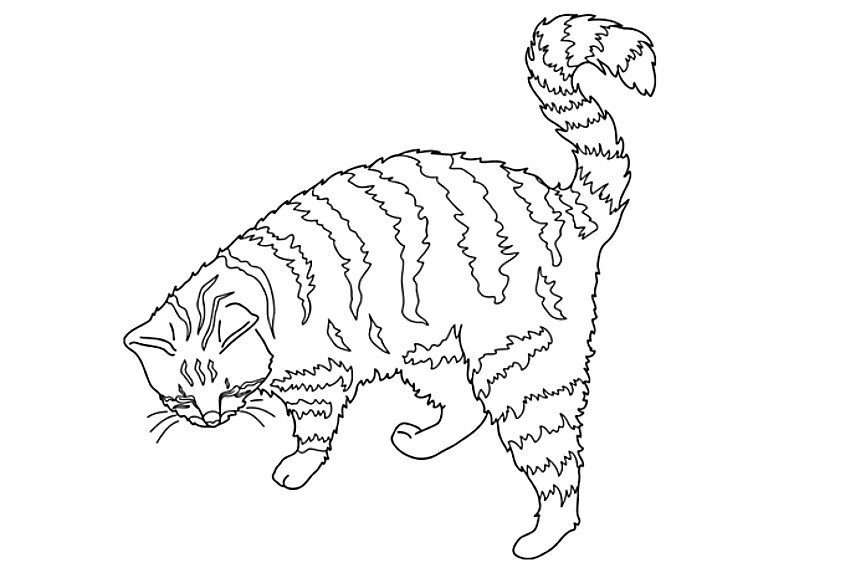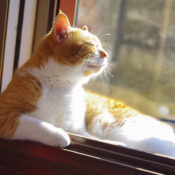I’ve had a string of cats over my lifetime, each living, give or take, fifteen years. Fifteen years isn’t my lifetime, but it is a lifetime. I never thought I’d top the Rosie Era. She was a tiny black thing who lived with me in my New York City apartment when I was single, and later out in the woods with me and my husband. Rosie loved nothing more than to drag a steamed ear of corn under the couch to gnaw on. She curled up with me under the covers in such a way that our heads rested together on one pillow, and when I took baths, she climbed on the edge of the tub and “fell” in. Every time. Year after year. When I had one of my miscarriages (the brutal one during my second trimester), only Rosie was home as I crawled back and forth between the bed and the bathroom. For the 24 hours I needed to recover, Craig put her food bowl by the bed so she’d eat. Oh how I loved Rosie.
The era we’re currently in, though, is the Era of Zonker. Unlike Rosie, who moved around with me a lot, Zonker has lived for 15 years straight in this one house. He knows every inch of the attic, every corner of the kitchen. He knows where the mice go when he chases them, and which doors swing closed so quickly that they might pinch his tail. He was by my side when I emerged from an illness a few years ago into the fully formed, childless author I suspect I was meant to be.
###
We adopted Zonker when he was over a year old. At the pound they gave me drops to put in what they called his “bad” eye, because, they said, it was infected. So I harassed the poor guy for his first week home, pinning him down and putting drops in his eye, which he would then try to shake out. When I took him to his first vet appointment, though, his eye wasn’t infected. It was smaller and kind of sunken-in, with a non-reactive pupil. The vet told me that Zonker’s blindness in that eye was congenital, meaning he’d been born that way. Zonker and I were both relieved when I threw away the eye drops.
Zonker is, as Dad used to call complicated people, “full of personality.” He’d lived that first year of his life at the pound mostly in a cage, so he didn’t know simple things like how to jump up on furniture. If I went upstairs, he’d stand at the bottom meowing in his unearthly, echo-location way, more porpoise than cat. I’d go down to get him, and he’d run and hide. That whole first year there were a lot of strange meowing sounds, with me calling, “I’m over here Zonker,” to no avail. “I’m here!”
I made it a point to reach for him slowly, to pet him only when invited, to leave him alone when he hid, to sit nearby and show him that I wasn’t going to hurt or frighten him. When I sometimes fumbled and held him awkwardly (from my own lack of grace), he was forgiving. Slowly Zonker learned to climb the stairs, and then, after I’d been lifting him onto the bed every day for a year or so, one day, just like that, he jumped on the bed and started cleaning himself as though he had been up on the bed all along. He continued to howl for me from the bottom of the stairs, (he still does that over 15 years later), but after that first year, I’d begun to gain his trust and he settled in as animals do, which sort of kills me, the way simple kindness heals so reliably, and the way animals find it in them to trust us, despite everything.

When I got sick a few years ago, my relationship with Zonker intensified. I had come home from the hospital after surgery and convalesced in the daybed in our sunroom. My first night home, Zonker jumped up on the daybed, but instead of standing on my stomach as he normally would, he stayed by my feet, leaning against me just enough to let me know he was there. His warm body curled up like a peanut against my ankle reassured me. For several weeks I was pretty sick and stayed in bed day and night. I occasionally heard Zonker thudding onto the floor to get food and water, or to use the litter box, but other than that, he remained on the bed by my feet. I whispered to him in the dark. He invaded my dreams, and then, after many weeks had passed, he walked to my face, curled up on my pillow, and slept. He sensed that I was better, and this was how he told me so.
I joked with my husband that Zonker had become my best friend, but it wasn’t really a joke. He and I rely on each other. I give him food and water. I brush his thick fur and cut out the knots with nail scissors. And he is my companion, my comfort, always nearby. Zonker chews the corner of my book as I read at night. When I touch his paws, he stretches his toes apart so that I can massage each one separately. No other cat has allowed me to do that. I know his eating habits, know that he needs dry food first thing in the morning or he’ll barf everything up.
When Zonker and I get into bed every night, I tell him the truth. “You have a good face, Zonker,” I say. “You are safe here with me.”
I ask him to live forever, aware that this is part of my mourning his eventual death. Barring something unforeseen, I’ll almost certainly outlive him. At 57 I know the routine of loss. When Zonker is gone, I’ll accidentally call for him. For a while I’ll continue to think that I hear the pads of his little cat feet hurrying down the wooden stairs when I get home from work.
I have questions for Zonker. I wonder what the world looks like from his one good eye. I wish he could tell me why, during heatwaves, he goes to the hottest spot in the attic to bake himself. Of course, the real question we are always asking our pets is: “What in god’s name will I do without you?” The lesson every creature in my life has been trying to teach me is how to face the world without them, knowing that we all eventually move away from one another. It’s a lesson I just keep learning, over and over.
Still, I ask for the impossible. “Please live forever,” I say to Zonker as he chews the corner of my book. “I’m here,” I tell him. I’m here. I’m here. I’m here.
Become a Saturday Evening Post member and enjoy unlimited access. Subscribe now




Comments
Beautiful. Zonker sounds delightful.
My friend has a former Brooklyn street cat who moved to the burbs about 15 years ago. She is amazing at 17+
and just might outlive us all.
I’m hoping for at least 5 more years with our Zonker
There was something familiar about Zonker’s photo I failed to mention the other day Ms. Moss. He reminds me a lot of Carole King’s cat on the cover of her 1971 ‘Tapestry’ album, keeping her company by the window.
Beautiful. All cat lovers can relate; certainly I do. Thank you for sharing.
Cats are so good!!!
Lovely story. It parallels some of my thoughts about Remy Claude, an all-black rescue cat. One sinfully expensive major operation and multiple procedures notwithstanding, he is still a living being I would go the extra mile for.
He knows me. As the hour approaches 10 pm or so, he jumps up on my bed, knowing I will give him a extra cuddle before nodding off.
What a wonderful on-going story of the unique and beautiful bond you have with your cat, Zonker.
He obviously was meant to come into your life when he did. Hopefully you have several more quality years together; especially with all of the anti-aging supplements we have now.
When the time comes, he’ll let you know, and that you’re both going to be okay. For now, one purring day at a time with a little catnip perhaps?